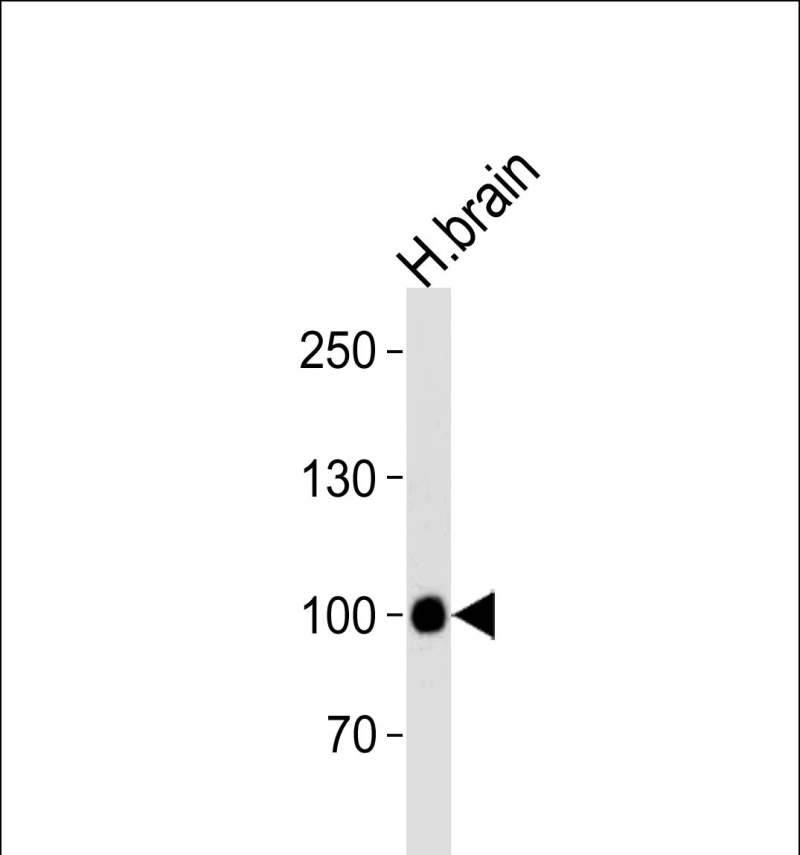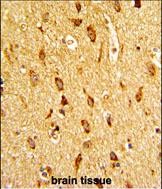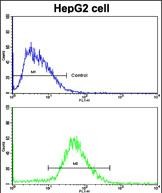


| WB | 咨询技术 | Human,Mouse,Rat |
| IF | 咨询技术 | Human,Mouse,Rat |
| IHC | 1/100-1/500 | Human,Mouse,Rat |
| ICC | 技术咨询 | Human,Mouse,Rat |
| FCM | 1/10-1/50 | Human,Mouse,Rat |
| Elisa | 咨询技术 | Human,Mouse,Rat |
| Aliases | Cadherin-13, Heart cadherin, H-cadherin, P105, Truncated cadherin, T-cad, T-cadherin, CDH13, CDHH |
| Entrez GeneID | 1012 |
| WB Predicted band size | 78.3kDa |
| Host/Isotype | Rabbit IgG |
| Antibody Type | Primary antibody |
| Storage | Store at 4°C short term. Aliquot and store at -20°C long term. Avoid freeze/thaw cycles. |
| Species Reactivity | Human, Mouse |
| Immunogen | This H Cadherin (CDH13) antibody is generated from rabbits immunized with a KLH conjugated synthetic peptide between 146-174 amino acids from the N-terminal region of human H Cadherin (CDH13). |
| Formulation | Purified antibody in PBS with 0.05% sodium azide. |
+ +
以下是关于CDH13(N-term)抗体的3篇参考文献及其摘要内容的简要概括:
---
1. **文献名称**:*CDH13 promoter hypermethylation regulates Wnt/β-catenin signaling in lung cancer*
**作者**:Sunami E. et al.
**摘要**:研究揭示了CDH13在非小细胞肺癌中因启动子高甲基化而表达下调,通过N端抗体检测发现其缺失促进Wnt/β-catenin信号通路活化,从而驱动肿瘤进展。
2. **文献名称**:*CDH13 acts as a tumor suppressor in colorectal cancer by modulating cell adhesion and migration*
**作者**:Li Y. et al.
**摘要**:利用CDH13(N-term)抗体进行免疫组化分析,发现CDH13低表达与结直肠癌转移相关,其失活导致细胞间粘附减弱并增强侵袭能力。
3. **文献名称**:*CDH13 deficiency alters synaptic plasticity and cognitive function in Alzheimer’s disease models*
**作者**:Díaz-Ruiz C. et al.
**摘要**:通过Western blot和免疫荧光(使用N端特异性抗体),发现CDH13在阿尔茨海默病模型中表达降低,影响神经元突触可塑性及认知功能退化。
---
(注:以上为示例,实际文献需根据具体数据库检索结果调整。)
The H Cadherin (CDH13), also known as T-Cadherin, is a unique member of the cadherin superfamily of calcium-dependent cell adhesion molecules. Unlike classical cadherins, CDH13 lacks transmembrane and cytoplasmic domains, instead anchoring to the cell membrane via a glycosylphosphatidylinositol (GPI) moiety. It plays critical roles in cell-cell adhesion, signal transduction, and tissue morphogenesis, with involvement in processes such as neuronal development, cardiovascular patterning, and adipocyte metabolism. CDH13 is also implicated in various pathologies, including cancer progression (acting as both tumor suppressor and promoter depending on context), neuropsychiatric disorders (e.g., schizophrenia, ADHD), and cardiovascular diseases.
The CDH13 (N-term) antibody specifically targets the N-terminal extracellular domain, which contains conserved cadherin repeats essential for calcium-mediated homophilic binding. This region is crucial for CDH13's adhesive functions and interaction with membrane receptors like adiponectin receptors or integrins. Researchers use this antibody in techniques such as Western blotting, immunohistochemistry, and immunofluorescence to study CDH13 expression patterns, localization, and functional modulation in normal tissues and disease models. Its application has helped elucidate CDH13's dual roles in cellular signaling – mediating both pro- and anti-proliferative effects through pathways like PI3K/AKT and Wnt/β-catenin. The antibody's specificity for the N-terminal region makes it particularly valuable for investigating structural-functional relationships and post-translational modifications affecting CDH13 activity.
×